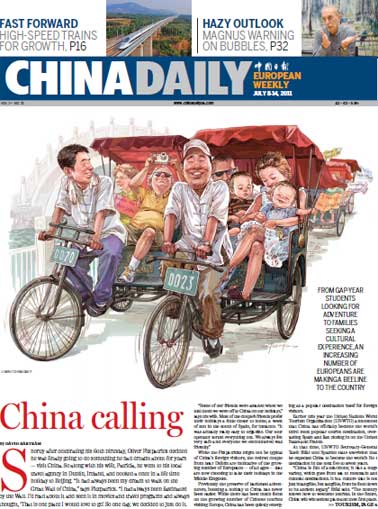Foreign and Military Affairs
China-US military ties require mutual trust
Updated: 2011-07-13 19:46
(Xinhua)
BEIJING - Six months after then US Defense Secretary Robert Gates visited China to revive bilateral military ties, top US military officer Mike Mullen's China trip indicates that an inter-military exchange mechanism is in the making. Yet the future of China-US military ties requires mutual respect and trust.
Mullen's four-day trip was fully packed with talks with China's senior leadership and visits to key army, air and navy units including the Second Artillery Force, which commands China's nuclear hardware.
These arrangements were made in order to highlight openness, transparency and self-confidence of China's military power as well as reciprocal gestures to the United States' opening of its largest naval base to Gen. Chen Bingde, chief of General Staff of the People's Liberation Army (PLA) in May.
Mullen and Chen, after Monday's closed-door talks at the PLA's headquarters in Beijing, agreed to further grow bilateral military links and to jointly maintain stability and prosperity in the Asia-Pacific. They have also agreed to carry out a number of military exchange programs, including joint medical and rescue drills later this year and next year.
As a matter of fact, military interactions between the world's top two economies have been considered the most fragile and delicate part of overall China-US relations.
The recent improvement in China-US military ties faces possible challenges as the two sides still diverge over issues like US arms sales to Taiwan and surveillance near Chinese coast, as well as U.S-Philippine and US-Vietnamese military drills near South China Sea.
These issues concern China's core interests and therefore need careful handling on the side of the United States if it expects to have a healthy relationship with China.
As two giants in the region, a stable, secure and peaceful Asia-Pacific is in the interests of both China and the United States. The two countries need not only to expand their common ground but also solve differences through candid dialogues.
The two armed forces should also work harder to deepen mutual trust. Opening sensitive military installations to each other undoubtedly contributes to that.
During Chinese President Hu Jintao's US visit earlier this year, the two nations reaffirmed in a joint communique that a healthy, stable and reliable military-to-military relationship is an important part of positive, cooperative and comprehensive China-US ties.
Gen. Mullen, who arrived in China on July 9, said at China's Renmin University that pursuing a positive and renewed military relationship will take a serious commitment, but ultimately, will provide benefit that extends far beyond both countries' borders.
As Mullen wraps up his China visit, which he himself called a "very positive step" and "a beginning," the two nations still have a long way to go. And the future of the relationship that could shape the 21st century may well depend on their commitments to the principle of mutual respect and trust.
E-paper

Burning desire
Tradition overrides public safety as fireworks make an explosive comeback
Melody of life
Demystifying Tibet
Bubble worries
Specials

90th anniversary of the CPC
The Party has been leading the country and people to prosperity.

Say hello to hi panda
An unusual panda is the rising star in Europe's fashion circles

My China story
Foreign readers are invited to share your China stories.
